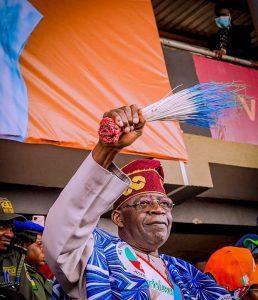In 1999, the presidency was not only ceded to the South of Nigeria but was also micro-zoned to the Southwest. That was explicably made possible by the elite consensus that preponderated the polity at that intersection due to the injustice that circumscribed the annulment of the June 12, 1993 presidential poll by the Ibrahim Badamasi Babangida (IBB)-led junta. Chief Moshood Kashimawo Olawale Abiola, the presidential candidate of the Social Democratic Party (SDP) from Ogun State in the Southwest of Nigeria had defeated a northerner, Alhaji Bashir Tofa, from Kano in the poll that defied the writ large fact of Abiola and Babagana Kingibe’s Muslim-Muslim ticket that was coupled by Abiola and his SDP to address the existential political exigencies, the sort that Bola Tinubu, the presidential candidate of the All Progressives Congress (APC) is dealing with now, with the Abiola-Kingibe prescription, thirty years after. Nigerians had voted for the ticket in spite of its cold insensitivity to religion and religious considerations. Looking back to that epoch, it could be surmised that the Abiola persona, largely constructed and sharply defined by his eleemosynary acts, pushed the issue of religion to the second place in the pyramid of considerations and factors. But has Tinubu been able to attract Abiola’s kind of pan-Nigerian appeal, association, approbation and validation?
The mindless annulment of the pan-Nigeria mandate invested in Abiola had consistently unsettled the polity and the situation fitted perfectly into the contemplation of the popular Yoruba aphorism, which says “Ediye ba lokun, ara o ro okun ara o ro ediye,” transliterated thus: “The fowl has perched on clothes line, both the line and the fowl are ill at ease.” IBB had to hurriedly step aside; and, in the process, he coupled an Interim National Government (ING) headed by Chief Ernest Shonekan, a Yoruba man from Ogun State. What happened to the ING thereafter is a fact of history. What also happened to General Sani Abacha who sacked the ING about three months after and Abiola himself in the interregnum in between the military rule and the advent of democratic Fourth Republic had been well documented. Let us just rewind to the juncture where Abacha suddenly died and the regime of General Abdulsalami Alhaji Abubakar that took over was confronted with the necessity to deliver on a short programme of transition to civil rule not exceeding eleven months in office.
As a matter of deliberateness, the power elite that straddled the military (principally retired Army Generals with their foot soldiers taking charge of strategic commands in the service) and their civilian cohorts, had pandered to the relentless agitations by pro-democracy activists, largely typified by NADECO, pushing for the revalidation of the annulled June 12, 1993 presidential mandate won by Abiola, to force General Abubakar to commit to a short programme of transition. Significantly, in order to consummate their agenda to sooth the frayed nerves of the Southwest Yoruba, the presidency was micro-zoned to the zone. That was the reason the Peoples Democratic Party (PDP) produced Olusegun Obasanjo as its candidate and the other two parties-All Peoples Party and Alliance for Democracy (APP/AD) produced a consensus candidate in Chief Olu Falae as the two candidates in the election. The essence was to restrict the emergence of a president to the zone in clear pacific overture.
Since the consummation of that episodic gesture, subsequent presidential enterprises up till now have been devoid of the critical elite consensus. Significantly, Muhammadu Buhari’s entrance into the presidential race in 2003, his participation in 2007, 2011 and 2015, when he eventually won, disrupted possible consensus on ceding of the presidency to a particular region and/or zone.
Whereas, it was easy for Obasanjo, to secure and exhaust his two terms of office as president from 1999 to 2007, his successor, the late Umaru Yar’Adua would have had his turn of eight years if he had not died in office on May 5, 2010. His Vice-president, Dr Goodluck Jonathan, had to step in the saddle in quick succession to complete their first term of office. There were claims about an agreement that was reached for Jonathan to contest in 2011 to complete the second term of the Yar’Adua-Jonathan ticket. The unwritten agreement was for power to rotate to the North in 2015.
In fact, the powers-that-be in the PDP had pencilled down Sule Lamido as the party’s potential standard bearer. Obasanjo was a drum major for the Lamido project. But the project ran into a storm when, contrary to reasonable expectations, Jonathan, as sitting President, decided to seek re-election for another term of four years. That move precipitated internal revolt within the party. Five governors and some political gladiators in the North left the party in protest, just as five governors are protesting in the PDP, discounting as it were, the gravitas of Atiku Abubakar’s presidential candidature.
Significantly, Atiku Abubakar, who was interested in the presidency then left the PDP, knowing full well that he would not be able to upstage the applecart of a sitting President or beat him to the party’s ticket. The ratio (decidendi) for Atiku’s exit was well grounded on the principle of equity: it was the turn of the North to produce the president. He wanted to be, but he did demonstrate the “emi lo kan” sense of entitlement. He contested for the APC presidential ticket in Lagos, but was defeated along with others by Muhammadu Buhari. Even though, Atiku did not step into the presidency, another northerner did.
In 2022/2023, the ratio that strengthened the principle of equity on which Atiku grounded his abandonment of the PDP for the APC has now been reduced to mere obiter dicta. The real issue of equity upon which the Southern region of Nigeria is making a case for the presidency has lost its gravitas in Atiku’s contemplation in aid of his quest for presidential power.

The Waziri Adamawa has willy-nilly fallen into the mischief that arose from his own very cause of action against a Southern presidency in 2015. He approbated in 2015 and has reprobated in 2023 in matter of presidential power politics. Atiku faces sundry charges in the court of the Southern part of Nigeria, whose turn it is to produce the president after eight years of Buhari’s presidency, which comes to an end on May 29, 2023.
But consider the grounds of defence, which allies latch on to justify Atiku Abubakar’s participation in the 2023 presidential poll as the standard bearer of the PDP: lack of elite consensus in the PDP to micro-zone the presidential ticket to the Southeast. A one-time Senator and strong ally of Atiku Abubakar, contextualised the conversation between and among the gladiators in the PDP, which consequently provided the bases for individual decisions as soon as it was clear that a consensus could not be reached.
The Senator said that Atiku was ready to reach an agreement to forget his presidential ambition on one ground: that there should be a consensus among southern leaders to micro-zone the presidency to the southeast; otherwise, the presidential ticket should be thrown open to all zones of the country. The rationale was to cure the mischief of inequity that had denied the zone the opportunity of producing the president of the country for eon.
What happened at that point was that Rivers Stste governor, Nyesom Wike was reluctant to agree to that proposal. He wanted the presidency ceded to the South as a region. Atiku was said to have argued that the approach would cure the mischief of Southeast marginalisation from the presidency, which is in pari materia with the situation of the Northeast zone which has also not produced the president for a long period. In other words, the Northeast zone has as much claim of marginalisation from the presidency as the southeast. Wike reportedly frustrated the consummation of the elite consensus to micro-zone the PDP presidential ticket to the Southeast. The inevitable consequence of the dissonance was the decision by the PDP leaders to throw the presidential ticket open.
Pronto! Atiku was unencumbered to jostle for the ticket. He thus remains discharged of all conceivable accusations of conspiracy, desperation, avarice, and lack of good faith, among others, slammed on him to validate his anti-Southern presidency posture. While I discharge him on the basis of the disclosed facts of the failed negotiations to micro-zone to Southeast, I am constrained to acquit him. This is simply because, as a self-proclaimed “unifier”, he should have made the greatest patriotic sacrifice in history by, instead of throwing his hat in the ring for the ticket, deploying the magnitude of his influence and political weight in support of an aspirant from the Southeast zone.
Naturally, Atiku Abubakar’s support should have been for Peter Obi who was his running mate in the 2019 presidential poll. It was the dialectics of the race for the ticket and the potentialities of the outcome getting fractious as it has since turned out, that made Peter Obi to quietly egress the PDP for the Labour Party where he is now a consequential standard bearer that has enjoyed a series of rave straw polls and opinion surveys tipping him to win the February 25 presidential election.
Had Atiku Abubakar taken the Southeast support route in concert with forces countrywide rooting for equity for the zone in the context of a president from the Southeast, logically validated with the northern Nigeria rounding off its eight years of Buhari presidency on May 29, 2023, he would have written his name in gold as a force that made an Igbo president happen. That would have justified his “unifier” moniker. He would have given posterity a political signification in the post hoc appraisal of the emergence of an Igbo person as President at a historical cusp that he largely made possible. So, my summative verdict on the mischief of Atiku Abubakar’s divisive, rather than unifing candidature is: he is discharged on the basis of facts that supported his disposition to micro-zone the PDP ticket to the Southeast, but not acquitted for his inability to rise above the fray to demonstrate good faith in a potentially equitable Southeast Igbo presidency in spite of age-long desire to be Nigeria’s president, which is always reinforced by a community of associates and acolytes in contemplation of politics of prebendalism as against national interest.
● Mr Ojeifo contributed this piece from Abuja via ojwonderngr@yahoo.com



















